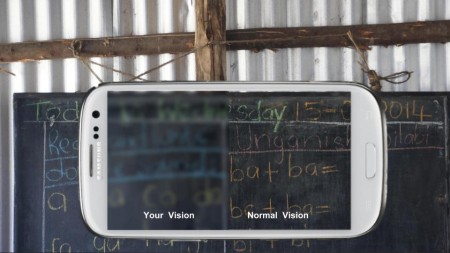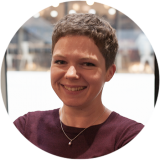
A simulation from the Peek Acuity vision check app showing the difference between clear sight and impaired distance vision.
Credit: Peek Vision
Having spent years working with science and health researchers to help communicate their work, it’s fair to say that I’ve seen more than my share of acronyms and abbreviations.
Researchers are busy people and their work is often complicated, so a major study will often have a memorable acronym devised for it. For example, you might hear people referring to the SMART study, which stands for Simple, Mobile-based Artificial Intelligence AlgoRithms in the Detection of Diabetic ReTinopathy.
As you might be aware, Peek began life as a research project at London School of Hygiene & Tropical Medicine, looking into how smartphones could improve access to eye health in low- and middle-income countries. In 2014, as the project was starting to really take off, the team came up with the name PEEK, standing for Portable Eye Examination Kit.
I’ve rarely come across a study acronym so perfect; it’s relevant, short, and memorable. So you might be surprised to learn that we’ve decided to move away from using it, and now we just call our organisation Peek. The difference might be subtle, but there’s a reason why we no longer use the capitalised, acronym version of our name.
In 2014, the “PEEK” acronym was a brilliant description of where we were – proving that a portable, cost-effective kit could be used to accurately check vision anywhere in the world using a smartphone.
But this was only ever going to be the first step in our journey. Thanks to the incredible work of our teams in Kenya, Botswana and India, research studies have now validated that original idea.
Today, we’ve moved beyond developing and validating our basic technology to building software systems that capture the information from smartphone-based eye health screening and surveys.
To bring better vision and health to everybody, we need to understand where people fall through the gaps when trying to access eye care and how eye care providers can ensure their systems improve.
Our smartphone-based tools make eye health screening and surveys accessible to schools and communities. Capturing the information from these activities allows health services to visualise and analyse information about who is attending treatment, where they are based, and what the outcome is. These insights can then be used to make eye health systems stronger and more efficient.
We believe these systems, which we are developing with our partners, including CBM and the Government of Botswana, will lead to a lasting improvement in health care for generations to come.
That is why our work now goes so much further than our original Portable Eye Examination Kit. The concept of a smartphone eye health kit was just the beginning of an amazing journey. We’re now on our way to developing the long-term, system-wide change we’ve always hoped to achieve.
As a communications professional, I’ll always appreciate the brilliant creative thought that went into the original “Portable Eye Examination Kit” name. But I also understand why we’ve moved away from using it. It’s a great example of how our scope and vision have evolved in the last few years, and it’s given us a name – Peek – that is recognisable and reminds all of us why we are here: to bring vision and health to everybody.

About the author: Daisy Barton is Head of Communications and PR at Peek Vision. She joined Peek in September 2017 following a decade working in communications and PR for science and health organisations including The Lancet group of medical journals, King’s College London, and the Royal Society.